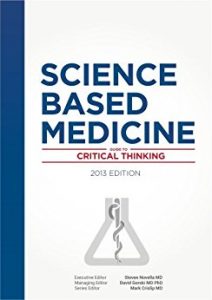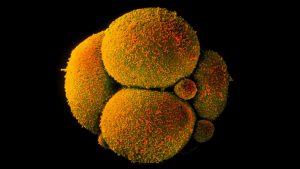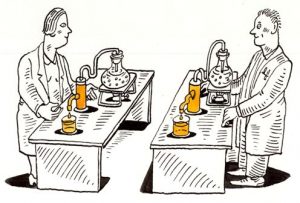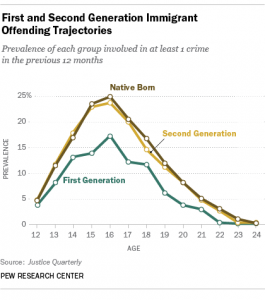Feb
28
2017

Recently Harvard University geneticist Prof George Church announced that he and his team are close to making a mammoth-elephant hybrid. They have been reconstructing mammoth DNA from frozen remains.
They will not be able to make a 100% mammoth clone, but rather they are splicing mammoth genes into Indian elephant DNA and hope to grow a hybrid. The result would have, they hope, enough mammoth traits to be adapted to a colder environment, and therefore essentially spread the range of the Indian elephant north.
Such programs raise two question – can we actually achieve de-extinction with such techniques, and should we?
The answer to the first question is – we’re not even close yet. The reporting of Church’s announcement was highly sensationalized, with many outlets reporting that we will have mammoths in two year. The reality is that Church’s team has made 45 mammoth DNA inserts into the Indian elephant genome. This is insignificant.
Estimates of the differences between mammoth and elephant DNA indicate that several thousand genes are involved. In addition, there may be even more regulatory changes in the DNA outside of genes. You can make a lot of evolutionary change by turning on or off, or up or down, the expression of genes without changing the genes themselves.
Continue Reading »
Feb
27
2017
 Tom Nichols’ book, “The Death of Expertise: The Campaign Against Established Knowledge and Why it Matters,” is currently on the Amazon bestsellers list. The book discusses a topic I have delved into many times here – what are the current general attitudes of the public toward experts and expertise, and how did we get here?
Tom Nichols’ book, “The Death of Expertise: The Campaign Against Established Knowledge and Why it Matters,” is currently on the Amazon bestsellers list. The book discusses a topic I have delved into many times here – what are the current general attitudes of the public toward experts and expertise, and how did we get here?
He mentions various aspects to this war against experts:
“The United States is now a country obsessed with the worship of its own ignorance. Many citizens today are proud of not knowing things. Americans have reached a point where ignorance, especially of anything related to public policy, is an actual virtue.”
The culture and our educational system have created a generation that has little experience being told they are objectively wrong. Everyone feels they are entitled to be right. Combine this with the illusion of knowledge provided by Google, and everyone thinks they are their own expert in anything.
Interestingly, as Nichols also points out, people are arbitrarily selective in which experts they respect. Sports is a great example. No one really thinks they should play for the NFL and begrudges recognizing that NFL players are the result of a combination of natural talent and years of developing physical ability and specific skills.
Continue Reading »
Feb
24
2017
 An excellent article in ProPublica by David Epstein discusses the problem of doctors not adhering to the best evidence-based standards. The full article is worth a read, and I won’t just repeat it here, but I do want to highlight a few points which align well with what I have been writing here and at SBM for years.
An excellent article in ProPublica by David Epstein discusses the problem of doctors not adhering to the best evidence-based standards. The full article is worth a read, and I won’t just repeat it here, but I do want to highlight a few points which align well with what I have been writing here and at SBM for years.
The essential problem is that there is a disconnect between the best evidence-based standards and what is actually practiced out in the world. There are actually two problems here. The first is the scientific evidence itself. The second is the alignment of practice to this evidence.
Scientific evidence in medicine has a few challenges. There is publication bias, researcher bias, p-hacking, the decline effect, and problems with replication. What all of this adds up to is that there is a lot of published preliminary evidence, most of which is wrong in the false positive direction. There is a tendency, in my opinion, of adopting treatments prematurely.
Continue Reading »
Feb
23
2017
 It appears that Google has removed all Natural News content from their indexing. This means that Natural News pages will not appear in organic Google searches.
It appears that Google has removed all Natural News content from their indexing. This means that Natural News pages will not appear in organic Google searches.
This is big news for skeptics, but it is also complicated and sure to spark vigorous discussion.
For those who may not know, Mike Adams, who runs Natural News, is a crank conspiracy theorist supreme. He hawks snake oil on his site that he markets partly by spreading the worst medical misinformation on the net. He also routinely personally attacks his critics. He has launched a smear-campaign against my colleague, David Gorski, for example.
A few years ago Adams put up a post in which he listed people who support the science of GMOs to the public, comparing them to Nazis and arguing that it would be ethical (even a moral obligation) to kill them. So he essentially made a kill-list for his conspiracy-addled followers. Mine was one of the names on that list, as were other journalists and science-communicators.
In short Adams is a dangerous loon spreading misinformation and harmful conspiracy theories in order to sell snake oil, and will smear and threaten those who call him out. He is an active menace to the health of the public.
Adams is a good example of the dark underbelly of social media. It makes it possible to build a massive empire out of click-bait and sensationalism.
Continue Reading »
Feb
21
2017
 Researchers have published in PNAS promising results from a snail venom analogue used in the treatment of pain. This is exciting for a number of reasons, even if the current compounds under study do not pan out.
Researchers have published in PNAS promising results from a snail venom analogue used in the treatment of pain. This is exciting for a number of reasons, even if the current compounds under study do not pan out.
Pain is a difficult clinical problem. There are limited options for treating chronic pain and we can quickly run out of options if patients cannot tolerate certain classes of drugs. What we really need are entirely new classes of pain medication, and that is what this new approach promises.
There are essentially two neurological components to pain: there is the physical sensation, and then there is the emotional component. It is interesting to ask the question, why does pain hurt? There is nothing about the sensation itself that is inherently painful. Any sensation is just nerve cells firing and carrying signals to areas of the brain that interpret those signals. Pain hurts because pain pathways specifically connect to the emotional centers in the brain to create a negative experience.
For further background, clinically it is helpful to distinguish different types of pain. There is nociceptive pain, which is the nervous system appropriately sensing damage and generating protective painful sensations. There is also neuropathic pain, which is the nervous system malfunctioning and producing inappropriate pain that is not protective. We further divide pain into acute and chronic. Finally, we consider the context of the patient, such as whether or not they are terminal.
Continue Reading »
Feb
20
2017
 The recent rapid development of CRISPR technology, which has made gene editing fast, affordable, and accurate, has rekindled the ethical debate about human gene editing. Last week a special panel put together by the National Academy of Sciences gave a “yellow light” to human germline gene editing – saying that such editing might be ethical once the risks were properly assessed.
The recent rapid development of CRISPR technology, which has made gene editing fast, affordable, and accurate, has rekindled the ethical debate about human gene editing. Last week a special panel put together by the National Academy of Sciences gave a “yellow light” to human germline gene editing – saying that such editing might be ethical once the risks were properly assessed.
Germline editing means that the changes would be part of the gametes, the sperm or egg, and would therefore be passed down to offspring. If gene editing were done to a fertilized then this would affect all cells, including the germ cells.
By contrast somatic cell editing would affect only adult cells and not be passed down to the next generation. Such editing would only affect the individual.
The ethical controversy over germline editing is that such changes essentially can become a permanent part of the human population.
What Changes are Acceptable?
The NAS report essentially lays out two criteria for human germline editing. The first is that research shows that such editing is safe in humans without any unintended consequences. They want to make sure that dangerous changes to the human genome will not enter the human population. This is, of course, a perfectly reasonable criterion.
Continue Reading »
Feb
17
2017
 In a recent article for Slate, Jacob Grier argues that the science used to justify widespread bans on smoking in public places was flawed. Recent more robust research has show little to no health benefit from such laws, he argues. While he has a point regarding the arc of scientific evidence, I think he is going too far in the other direction in his conclusions about the science.
In a recent article for Slate, Jacob Grier argues that the science used to justify widespread bans on smoking in public places was flawed. Recent more robust research has show little to no health benefit from such laws, he argues. While he has a point regarding the arc of scientific evidence, I think he is going too far in the other direction in his conclusions about the science.
Second Hand Smoke
The current consensus of evidence is that there are health risks to second hand smoke, although they are statistically small. Debate centers around the magnitude of the effect, with few doubting that there is a negative health effect. Negative health effects include heart attacks, lung cancer, stroke, and exacerbation of asthma. On a population level, even small increased risks result in large numbers of excess deaths and negative health outcomes. The CDC estimates, for example, that second-hand smoke exposure results in 34,000 excess cardiac deaths each year.
Increased recognition of the health risks of passive smoke exposure lent significant political weight to anti-smoking efforts, resulting in a cultural shift over the last 30 years. As a result smoking has largely been banned in most indoor public places and many work places.
The empirical question on which Grier focuses is the impact of those smoking bans on health outcomes. He does a fairly thorough review of the literature, although I think his review is biased to make his point, that the health benefits of such bans have been overplayed and maybe don’t exist.
Continue Reading »
Feb
16
2017
 We have an anti-vaccine president. One of my concerns about Trump the candidate was that one of his most consistent positions over the years was blaming vaccines for the alleged autism epidemic (there isn’t one, by the way). Once elected it did not take long for this to manifest as a policy priority. In January Trump met with RFK Jr. to discuss him heading an Orwellian commission on vaccine safety and scientific integrity.
We have an anti-vaccine president. One of my concerns about Trump the candidate was that one of his most consistent positions over the years was blaming vaccines for the alleged autism epidemic (there isn’t one, by the way). Once elected it did not take long for this to manifest as a policy priority. In January Trump met with RFK Jr. to discuss him heading an Orwellian commission on vaccine safety and scientific integrity.
At a recent meeting with educators, Trump continued to express his false belief in a “tremendous increase” in autism:
“Have you seen a big increase in the autism with the children?” Trump asked Jane Quenneville, the principle of a Virginia public school that specializes in special education. Quenneville responded that she had.
Trump continued: “So what’s going on with autism? When you look at the tremendous increase, it’s really such an incredible — it’s really a horrible thing to watch, the tremendous amount of increase. Do you have any idea?”
“The autism?” Really? Continue Reading »
Feb
14
2017
 John Ioannidis has published an interesting commentary in JAMA about the current reproducibility crisis in basic and clinical scientific research. Ioannidis has built his career on examining the medical literature for overall patterns of quality. He is perhaps most famous for his study showing why most published research findings are wrong.
John Ioannidis has published an interesting commentary in JAMA about the current reproducibility crisis in basic and clinical scientific research. Ioannidis has built his career on examining the medical literature for overall patterns of quality. He is perhaps most famous for his study showing why most published research findings are wrong.
The goal here is to improve the science of science itself (or “metascience,” like “metacognition”). As science has progressed a few things have happened. The questions are getting deeper, more complex, and more subtle. Research methods have to be more rigorous in order to deal with these more subtle questions.
The institutions of science have also grown. Science is big business, which means that there are “market forces” which push institutions, scientists, and publishers into pathways of least resistance and maximal return. These pathways may not be optimal for quality research, however.
The stakes are also getting higher. We now have professions and regulatory schemes that are supposed to be science-based. If we take medical products, for example, the public is best served is products are safe and effective and truthful in the claims made for them. We need scientific research to tell us this, and we need to know where to set the bar. How much scientific evidence is enough? We can only answer this critical question if we know how reliable different kinds of scientific evidence are.
Continue Reading »
Feb
13
2017
 Does legal or illegal immigration increase crime? That is an empirical question that should be answerable through rigorous research. Whatever the answer, it should inform our policy priorities and decisions. At the very least, if we are going to have a national conversation about immigration, the established facts should serve as common ground.
Does legal or illegal immigration increase crime? That is an empirical question that should be answerable through rigorous research. Whatever the answer, it should inform our policy priorities and decisions. At the very least, if we are going to have a national conversation about immigration, the established facts should serve as common ground.
When you are done laughing (or crying) you might be interested to read about recent research into the correlation between patterns of immigration and various types of personal and property crime. Researchers have previously looked at this question by focusing on individuals – are immigrants more or less likely to commit crimes than native born Americans? Let’s consider that question first.
The research overwhelmingly shows that first generation immigrants, whether legal or illegal, are less likely to commit all types of crime at all ages than the native born. Interestingly, by second generation the statistics look more like native born crime rates, so it does not take long to assimilate in this regard. As an aside, this, of course, does not include crossing the boarder illegally itself, but it has been pointed out that being an undocumented immigrant is not a criminal offense, but a civil offence.
Continue Reading »


 Tom Nichols’ book, “The Death of Expertise: The Campaign Against Established Knowledge and Why it Matters,” is currently on the
Tom Nichols’ book, “The Death of Expertise: The Campaign Against Established Knowledge and Why it Matters,” is currently on the  An
An  It appears that Google has removed all Natural News content from their indexing. This means that Natural News pages will not appear in organic Google searches.
It appears that Google has removed all Natural News content from their indexing. This means that Natural News pages will not appear in organic Google searches. Researchers have published in PNAS
Researchers have published in PNAS The recent rapid development of CRISPR technology, which has made gene editing fast, affordable, and accurate, has rekindled the ethical debate about human gene editing. Last week a special panel put together by the National Academy of Sciences
The recent rapid development of CRISPR technology, which has made gene editing fast, affordable, and accurate, has rekindled the ethical debate about human gene editing. Last week a special panel put together by the National Academy of Sciences  In a recent article for Slate,
In a recent article for Slate, We have an
We have an  John Ioannidis has published an
John Ioannidis has published an Does legal or illegal immigration increase crime? That is an empirical question that should be answerable through rigorous research. Whatever the answer, it should inform our policy priorities and decisions. At the very least, if we are going to have a national conversation about immigration, the established facts should serve as common ground.
Does legal or illegal immigration increase crime? That is an empirical question that should be answerable through rigorous research. Whatever the answer, it should inform our policy priorities and decisions. At the very least, if we are going to have a national conversation about immigration, the established facts should serve as common ground.




